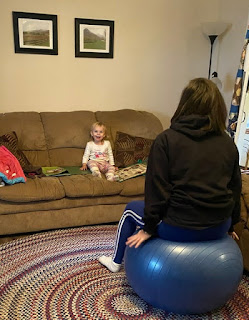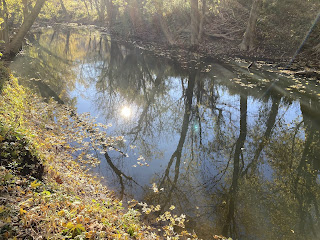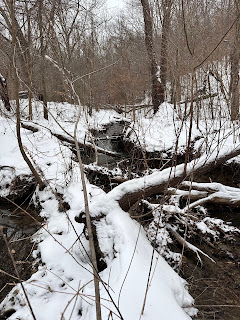Sometimes a burst of memories will randomly surface, like bubbles in a glass of icy Co-cola.
I was sitting on the porch Sunday morning, when all of a sudden I was 40 years younger and walking from mom and dad's house to the old storehouse where we stripped our tobacco crop each fall.
Sunday's weather was hot, but the light had that certain slant. I guess that's what transported me back.
I could picture Pam and myself, walking along under the blue sky bright as glory, the creek we followed below the road blackened with tannins from fallen leaves. There would be a smattering of yellowed leaves still floating on the surface.
Tattered maple and crunchy brown sycamore leaves would cover the one-lane road, and we'd kick them up as we walked.
I can still hear the sound of the store's old wooden door as we pushed it open, the thunk the old metal latch made. I can smell the dry tang of tobacco, tinged with the lingering peppery scent of curing meat. (We used the old store for curing country ham and side meat after the tobacco was all stripped and sold.)
On a warm sunny day, we would have worked with the storehouse door open, the sun streaming through in the afternoon and highlighting dust beams.
The radio would have been playing Paul Simon's Fifty Ways to Leave Your Lover or something like that. Pam and I would sing along and try to remember all the ways... You just slip out the back, Jack..make a new plan, Stan...you don't need to be coy, Roy, Just get yourself free Hop on the bus, Gus, You don't need to discuss much Just drop off the key, Lee, and get yourself free. :)
We'd work by the stripping bench with neighbors and other family members. The bench would be piled high with tobacco stalks, and the first person in line would pick up a stalk and strip off the bottom leaves, then pass it to the next person, who'd strip off a few more leaves before passing it on down to the last person who would strip off the last "grade" of tobacco, the reds. We were always advised to leave the "suckers," those unwanted leaves that came out after the bloom had been broken off back in August. Those leaves would be smaller and the stem slimier.
After the stalk was stripped, it would be thrown into a pile on the floor. If you did it right, all the stalks would land in a neat straight pile of stalks. Once there was an armload of them, someone would carry them out and toss them on a wagon. When the wagon was full, the stalks would be scattered on the hillside pasture, where they would melt into the ground over the course of the winter, fertilizing next spring's grass.
For many years we'd hand-tie the leaves, then drape them over a tobacco stick. When the stick was full, it would be carried to the tobacco press and hung. After a number of full sticks were put into it, someone would lever the wooden panel that would press the tobacco flat.
The last few years we raised tobacco, we'd place the leaves, stem facing to the sides, in a tobacco baler. That made the process faster, but it took some of the artistry out of it. There's something beautiful about a stick of neatly tied tobacco hands.
I remember other little things about the storehouse...we'd keep a stash of hard candies, "Christmas candies" or a bowl of busted peppermint stick, on the dusty counter, which was also piled high with our coats and gloves. We always laid them beside the old glass candy case that was in use when my grandpa ran the store.
Our excuse for sucking on hard candy all day long was that it kept our mouths moist as we worked in the dust.
Uncle Clyde made an appearance each day, as he would walk down to check his mailbox. I can see him coming down the gravel hill now, the ambling gait of his short overall clad legs. He would get his mail and stand by the potbellied stove to sort it. Junk mail either went into the fire or the ashpan below it to be used as a fire starter later.
He'd shove the rest of the mail into the large back pocket of his overalls to be read back at the house. If there was a bill in the mix, he'd usually pay it the next day or two.
He and Aunt Myrl always looked forward to getting their weekly newspaper. Aunt Myrl would cut out and save "the deaths" in a butter cookie tin. They'd talk about who got indicted, or who brought what property or how much Mazola oil was at the A&P. (They religiously followed the doctor's advice to switch from hog fat to vegetable oil for cooking.)
I wonder what they would think about me being editor of that paper now? I'm sure they'd tell me what they did and did not like about it.
I can still see Uncle Clyde wearing his winter cap with the flaps that folded down over his ears. I remember that his beaked nose always looked like it was about to drip whenever the weather was cold. and whenever he came into the warm store, his glasses would fog up and he'd take them off and wipe them. I'd think how different he looked without his glasses, his eyes a pale watery blue, his gaze a bit unfocused. He must have been near-sighted like me.
Uncle Clyde would usually pull up a chair and sit down and help us for a while, then he'd announce that he'd better get back to the house to feed the chickens.
Aunt Myrl, Uncle Clyde and Johnnie are all gone now. We no longer raise tobacco, or scatter the stripped stalks like a spilled bag of pretzel sticks on the hilly pasture. I haven't been in the old store for years.
But a certain slant of November light can take me back to a place that I had almost forgotten was still there.






















































